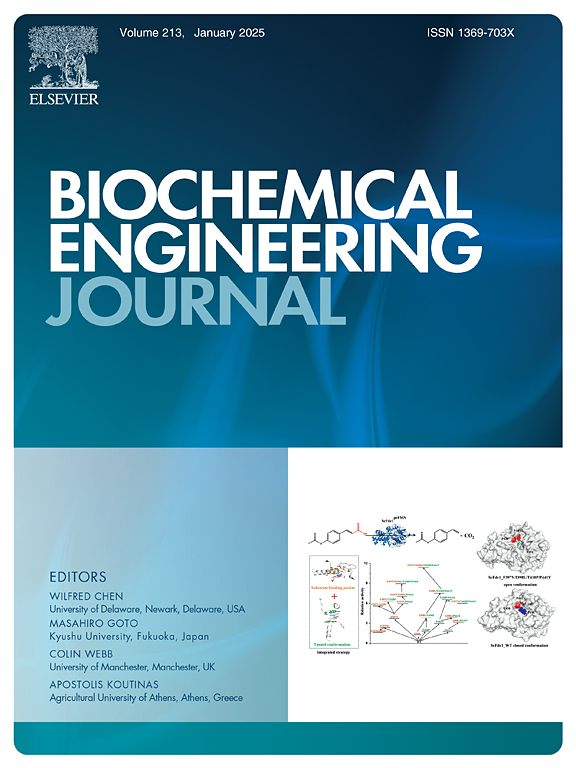利用代谢工程肺炎克雷伯菌株发酵生产 3-羟基丙酸
IF 3.7
3区 生物学
Q2 BIOTECHNOLOGY & APPLIED MICROBIOLOGY
引用次数: 0
摘要
3-羟基丙酸(3-HP)是一种重要的工业平台化学品,可用于制造超吸收或生物降解聚合物。与化学方法相比,通过生物方法生产 3-HP 预计更具竞争力。肺炎克雷伯菌是最有前途的宿主,因为它具有生产 3-HP 和维生素-B12 的先天能力,易于培养和工程化。本研究采用逐步代谢工程和发酵技术来提高 3-HP 的产量。在筛选候选基因后,利用质粒过量表达了肺炎双球菌衍生的ydcW基因。由 dhaT、yqhD、ldhA、glpK、poxB 和 pta-ackA 编码的主要竞争途径被阻断。此外,研究还表明,同时加强由偏好 NADPH 的 ydcW 基因和偏好 NADH 的 puuC 基因编码的两种原生醛脱氢酶,可协同提高 3-HP 的产量。在 72 小时的喂料批次发酵过程中,通过进一步强化 acs 基因以减少乙酸酯的积累,3-HP 的产量为 93.7 克/升,甘油产量为 0.42 克/克。这一性能足以满足工业应用的需要。本文章由计算机程序翻译,如有差异,请以英文原文为准。
Fermentative production of 3-hydroxypropionic acid by using metabolically engineered Klebsiella pneumoniae strains
3-Hydroxypropionic acid (3-HP) is an industrially important platform chemical for super-absorbent or biodegradable polymers. Its production via biological methods is expected to be more competitive than chemical methods. Klebsiella pneumoniae is the most promising host due to its innate capabilities for 3-HP and vitamin-B12 production, ease of culture, and ease of engineering. In this study, step-by-step metabolic engineering and fermentation technologies were used to enhance the production of 3-HP. K. pneumoniae-derived ydcW gene was overexpressed using a plasmid after screening candidate genes. Major competing pathways encoded by dhaT, yqhD, ldhA, glpK, poxB, and pta-ackA were blocked. Additionally, it was demonstrated that simultaneous reinforcement of two native aldehyde dehydrogenase encoded by the ydcW gene preferring NADPH and the puuC gene preferring NADH, synergistically improved 3-HP production. Additional reinforcement of the acs gene to reduce acetate accumulation resulted in 93.7 g/L of 3-HP with a yield of 0.42 g/g·glycerol over a 72-h fed-batch fermentation. This performance is deemed sufficient for industrial applications.
求助全文
通过发布文献求助,成功后即可免费获取论文全文。
去求助
来源期刊

Biochemical Engineering Journal
工程技术-工程:化工
CiteScore
7.10
自引率
5.10%
发文量
380
审稿时长
34 days
期刊介绍:
The Biochemical Engineering Journal aims to promote progress in the crucial chemical engineering aspects of the development of biological processes associated with everything from raw materials preparation to product recovery relevant to industries as diverse as medical/healthcare, industrial biotechnology, and environmental biotechnology.
The Journal welcomes full length original research papers, short communications, and review papers* in the following research fields:
Biocatalysis (enzyme or microbial) and biotransformations, including immobilized biocatalyst preparation and kinetics
Biosensors and Biodevices including biofabrication and novel fuel cell development
Bioseparations including scale-up and protein refolding/renaturation
Environmental Bioengineering including bioconversion, bioremediation, and microbial fuel cells
Bioreactor Systems including characterization, optimization and scale-up
Bioresources and Biorefinery Engineering including biomass conversion, biofuels, bioenergy, and optimization
Industrial Biotechnology including specialty chemicals, platform chemicals and neutraceuticals
Biomaterials and Tissue Engineering including bioartificial organs, cell encapsulation, and controlled release
Cell Culture Engineering (plant, animal or insect cells) including viral vectors, monoclonal antibodies, recombinant proteins, vaccines, and secondary metabolites
Cell Therapies and Stem Cells including pluripotent, mesenchymal and hematopoietic stem cells; immunotherapies; tissue-specific differentiation; and cryopreservation
Metabolic Engineering, Systems and Synthetic Biology including OMICS, bioinformatics, in silico biology, and metabolic flux analysis
Protein Engineering including enzyme engineering and directed evolution.
 求助内容:
求助内容: 应助结果提醒方式:
应助结果提醒方式:


